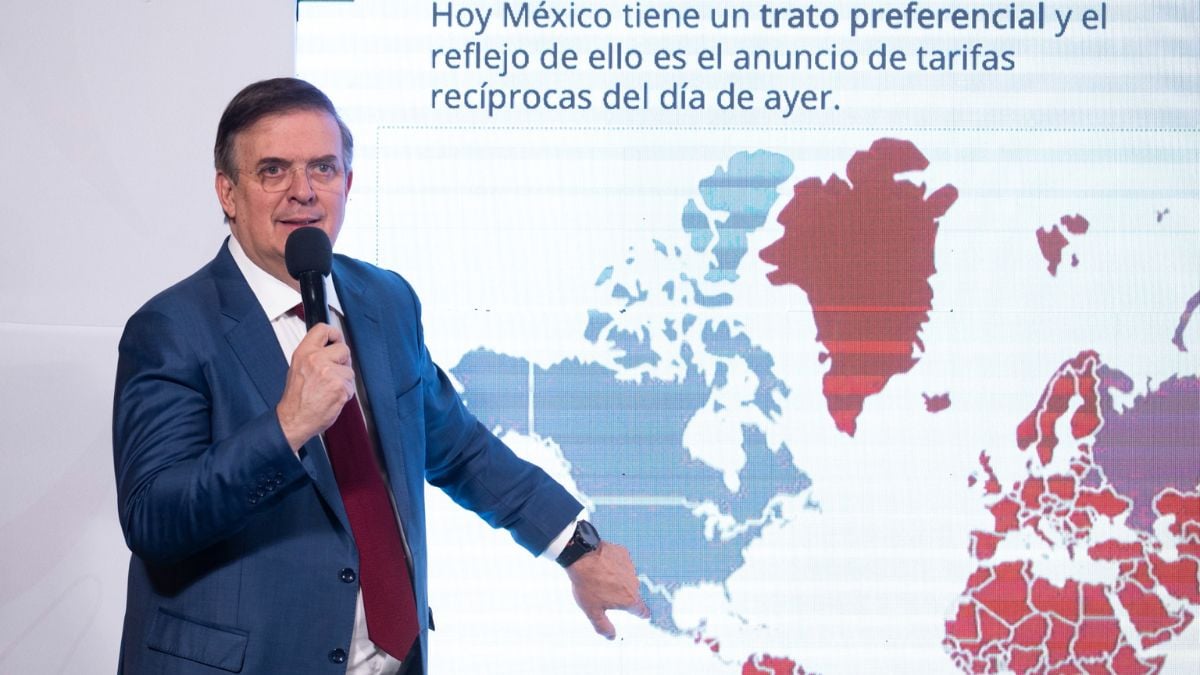
Secretary of Economy, Marcelo Ebrard, stated that Mexico has secured a preferential tariff treatment. He made this statement during the morning press conference held one day after the United States imposed new reciprocal tariffs on several global economies.
Ebrard presented a map illustrating the new configuration of global trade, explaining that the era of multilateral agreements based on Most Favored Nation conditions, typical of the World Trade Organization (WTO), is over. Instead, countries now face a fragmented system with differentiated tariffs, in which only a few nations have managed to obtain advantageous conditions. Mexico and Canada are the only economies that maintain a 0% tariff rate with the United States thanks to the USMCA (T-MEC).
What does preferential treatment mean for Mexico compared to other economies?
Unlike other nations with which the United States has trade agreements—such as Chile, South Korea, Israel, or Australia—that are now subject to reciprocal tariffs ranging from 10% to 25%, Mexico remains exempt. This status positions the country as a strategic partner in the new commercial order. “That is a major achievement,” Ebrard emphasized, “because when this started, there were not supposed to be any exceptions.”
The official document from the Ministry of Economy confirms that even neighboring countries and regional partners such as Costa Rica, Guatemala, or the Dominican Republic were affected by 10% tariffs. Mexico, meanwhile, holds on to its privileged position, thereby protecting over 10 million jobs directly linked to trade with the United States.
Which sectors of Mexico’s economy remain tariff-free?
The Secretary of Economy highlighted key sectors that have been exempted from the new tariffs, including the agro-food industry, electronic and electrical manufacturing, the chemical industry, apparel and footwear, medical and pharmaceutical devices, as well as machinery and equipment. These sectors represent a wide array of Mexican exports present throughout the country.
“Avocados are just one example of agro-food products that remain at zero tariffs,” Ebrard explained, accompanied by a visual collage illustrating the positive economic impact of the measure. He also stressed that the President’s focus has been to “protect jobs” and ensure that Mexico remains globally competitive.
READ ALSO: What tariffs DID the United States impose on Mexico?
Although the announcement of preferential treatment represents a major step forward, Secretary Ebrard warned that negotiations are ongoing. “This isn’t over yet; this is just one chapter,” he said. The coming weeks will be critical to renegotiating better conditions in sectors such as automotive, steel, and aluminum, which currently face a global tariff of 25%.
Mexico holds two parallel side letters under the USMCA that will serve as the basis for the negotiations expected to unfold over the next 40 days. The goal, Ebrard noted, is clear: “to secure the best conditions of any country in the world for the automotive industry.”
USMCA in the new global trade order
With the transformation of the international trade system, keeping the United States-Mexico-Canada Agreement (USMCA) in place is an achievement not to be underestimated. “In a new trade order based on tariffs, it’s very difficult for a Free Trade Agreement to survive,” Ebrard warned.
The Sheinbaum administration is determined to maximize the logistical advantage of proximity to the United States, the rules of origin set out in the USMCA, and the legal certainty that the agreement provides to investors and companies. In doing so, Mexico not only strengthens its geopolitical standing but also becomes a magnet for new investments seeking to avoid costly tariffs.
What impact will this have on Mexican exports?
Thanks to the preferential treatment, Mexico is now among the few economies with unrestricted access to the U.S. market. This is a significant incentive for foreign companies to relocate part of their operations to Mexican territory, as part of their nearshoring strategies.
“This is already a major advantage,” Ebrard concluded, “because it makes more sense to do things here than in other parts of the world.” In this way, the country not only protects its current exports but also positions itself as a manufacturing powerhouse in the emerging global trade order.










